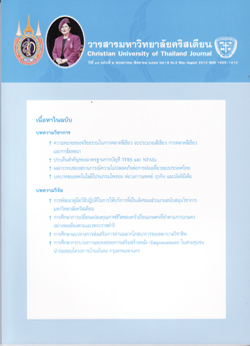ผลกระทบของสถานการณ์ความไม่ปลอดภัยต่อการท่องเที่ยวของประเทศไทย
บทคัดย่อ
ประเทศไทยเป็นประเทศที่มีศักยภาพสูงในด้านอุตสาหกรรมบริการและการท่องเที่ยว อันเนื่องจากการมีทรัพยากรทางการท่องเที่ยวที่หลากหลาย ทั้งทางธรรมชาติ สังคม วัฒนธรรม ประเพณี รวมทั้งโบราณสถานและโบราณวัตถุต่างๆ อีกทั้งลักษณะนิสัยของคนไทยอันโอบอ้อมอารีและเอาใจใส่แขกผู้มาเยือนด้วยความยิ้มแย้มแจ่มใส ซึ่งสิ่งเหล่านี้คือกลไกหลักที่ขับเคลื่อนเศรษฐกิจที่สำคัญที่ทำให้ประเทศไทยมีรายได้เพื่อนำมาพัฒนาประเทศได้เป็นจำนวนมากในแต่ละปี
แต่แม้ว่าจะมีศักยภาพและความพร้อมเพียงใดก็ตาม สถานการณ์ทางการท่องเที่ยวของประเทศไทย ก็ต้องเผชิญกับวิกฤติการณ์เรื่อยมา นับตั้งแต่ภายหลังจากเหตุการณ์คลื่นยักษ์สึนามิ พ.ศ.2547 ต่อด้วยการทำรัฐประหาร พ.ศ.2549 รวมไปถึงการยึดสนามบิน และอีกหลายเหตุการณ์ความไม่สงบต่างๆ จนกลายเป็นปัจจัยหลักที่ฉุดรั้งสถานการณ์ทางการท่องเที่ยวในภาพรวมของประเทศไม่ให้เติบโตไปในทิศทางที่ควรจะเป็น
บทความวิชาการเรื่อง “ผลกระทบของสถานการณ์ความไม่ปลอดภัยต่อการท่องเที่ยวของประเทศไทย” นี้ ผู้เขียนได้นำเสนอผลกระทบจากสถานการณ์ความไม่ปลอดภัยต่างๆ ที่เกิดขึ้นและมีผลโดยตรงต่อภาคบริการและการท่องเที่ยว ใน 3 ด้านที่สำคัญ ได้แก่สถานการณ์ความไม่สงบจากภัยธรรมชาติ สถานการณ์ความไม่สงบจากการขาดไม่มีเสถียรภาพทางการเมือง และสถานการณ์ความไม่สงบจากการก่อการร้ายในจังหวัดชายแดนภาคใต้ ซึ่งทั้งหมดที่กล่าวมานั้นเกิดขึ้นและกระทบต่อความปลอดภัยของนักท่องเที่ยวโดยตรง ทำให้นักท่องเที่ยวเกิดความไม่มั่นใจในด้านความปลอดภัยต่อตนเองและทรัพย์สิน จึงต่างพากันยกเลิกเที่ยวบิน ห้องพัก และบริการอื่นๆ ทำให้ผู้ประกอบการหลายคนต้องประสบกับภาวะขาดทุน อย่างไรก็ตาม จากการพยายามในการกระตุ้นตลาดและฟื้นฟูแหล่งท่องเที่ยวต่างๆ ที่ได้รับผลกระทบจากเหตุการณ์ข้างต้นอย่างเร่งด่วนของภาครัฐบาลและเอกชนก็ส่งผลให้อุตสาหกรรมการท่องเที่ยวและบริการเริ่มมีแนวโน้มที่ดีมากขึ้น
เอกสารอ้างอิง
Andrew Bond. (2010). Bangkok political crisis continues to have negative impact on Thailand tourism. [Online]. Available from https://express-press-release.net/72/Bangkok-Political-Crisis-Continues-Have-Negative-Impact-Thailand-Tourism-39576197.php. (Retrieved 23 May 2012).
Aly, Hassan Y. and Mark C.Strazicick. (2000). “Terrorism and tourism : Is the impact permanent of transitory? time series evidence from some MENA countries”. Ohio State University, Department of Economics, Columbus, Ohio.
Bangkok Post. (2008). Air cargo terminal to open soon. [Online]. Available from https://www.bangkokpost.com/021208_business/02Dec2008_biz30.php. (Retrieved 20 February 2012).
Department of Tourism. (2012). Tourism situation in Thailand. [Online]. Available from https://www.department-of-tourism.blogspot.com/2012/01/2554.html. (Retrieved 20 February 2012).
Drakos, Konstantinos and Ali M. Kutan. (2003). “Regional effects of terrorism on tourism : Evidence from 3 mediterranean countries.” Journal of Conflict Resolution. 45 (5) : 621-664.
Economist Intelligence Unit. (15 February 2012). Thailand politics : Bangkok blasts. [Online]. Available from https://viewswire.eiu.com/. (Retrieved 20 February 2012).
Edmunds, Christopher and James Mark. (22-23 June 2005). “Terrorism and tourism in the asia pacific region : Is travel and tourism in a new world after 9/11?”. APEC economics outlook symposium : The economics effects of terrorism and counter-terrorism. East west center working paper (Economic series) : 2.
Enders, Walt and Todd Sandler. (2005). “Economic consequences of terrorism in developed and developing countries : An overview.” The World Bank 2005: 17-47.
Garin-Munoz, T. and Perez Amaral, T. (2000). “An econometric model for international flows to Spain.” Applied Economics. : 525-529.
Gujarati, Damodar N. (2003). Basic econometrics. McGraw-Hill, Singapore.
Henderson, Joan C. (2003). “Terrorism and tourism : managing the consequences of the bali bombings.” Journal of Travel and Tourism Marketing. 15:1.
Humanitarian Health Action. (26 January 2006). South east asia earthquake and tsunamis : Thailand. [Online]. Available from : https://www.who.int/hac/crises/international/asia_tsunami/. (Retrieved 1 February 2012).
John Barnes. (2 December 2011). “Restoring Thailand's tourism destination image in the woke of the recent political crises : A FEW proposals”. Assumption University Journal : 1.
Joram Ndlovu, Elias Nyakunu. (Number 2, December 2009). “Branding a destination in a political crisis : Re-learning, re-thinking and realigning strategies”. University of Pretoria NJLC journal : 1.
Looney, Robert. (2002). “Economic costs to the United States stemming form the 9/11 Attacks,” Strategic Insight : 6.
Sonmez, Sevil, Yiorgos Apostolopoulos and Peter Tarlow. (1999). “Tourism in crisis : managing the effects of terrorism”. Journal of Travel Research. : 18.
World Tourism Organization. (2005). World tourism highlights 2004. [Online]. Available from: https://www.world-tourism.org/facts/menu.html. (Retrieved 1 February 2012).
_____. (2004). Indian Ocean earthquake-affected countries. [Online]. Available from : https://en.wikipedia.org/wiki/_ Indian_Ocean_earthquake_affected_countries. (Retrieved 15 February 2012).
_____. (2006). South Asia earthquake and tsunamis : Thailand. [Online]. Available from : https://www.who.int/hac/crises/international/asia_tsunami/tha/en/index.html. (Retrieved 15 February 2012).
_____. (2008). Thai Political Crisis. [Online]. Available from : https://en.wikipedia.org/wiki/_Thai_political_crisis. (Retrieved 15 February 2012).
_____. (2012). Bangkok Post on 14 February 2012. [Online]. Available from https://www.bangkokpost.com/multimedia/photo/279822/iranian-blows-off-own-legs-in-sukhumvit-bomb. (Retrieved 15 February 2012).



